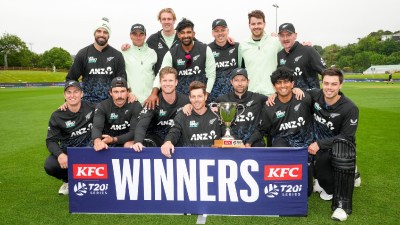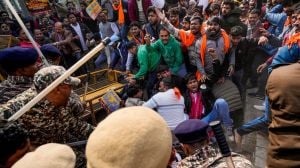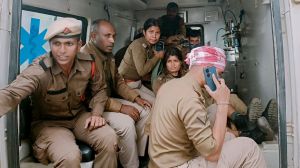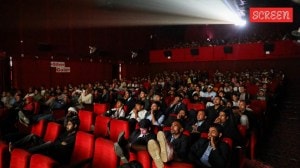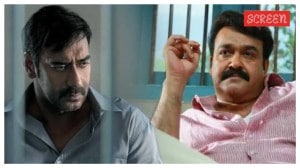CRPF DG should see force fully trained,motivated8230; does nothing dishonourable
In NDTVs Walk the Talk with Shekhar Gupta,E.N. Rammohan,former director general of BSF,talks about the importance of implementing land ceiling,and why a force should have strong leadership.
Last week,the government acted on the recommendations of E.N. Rammohan,who investigated the killing of 76 securitymen by Naxalites in Dantewada last month. In NDTVs Walk the Talk with The Indian Express Editor-in-Chief Shekhar Gupta, the former director general of BSF talked about working in the forests,the importance of implementing land ceiling,and why a force should have strong leadership.
Shekhar Gupta: My guest this week is one of the most honourable men in India,whether in uniform or out of it8211;E.N. Rammohan,former director general of BSF. You have the knack of finding yourself in the thick of action,always.
E.N. Rammohan: I dont know whether it is a knack. I dont know what is wrong with politicians,so I get kicked around.
Shekhar Gupta: Even after youve retired. When they really need an honourable man to find out what went wrong,say in Dantewada,they come to you.
E.N. Rammohan: I love going into the forests. But it is a very sad thing to see 76 people killed in an ambush. It was quite unnecessary. I think the government has not yet released that report.
Shekhar Gupta: Among the many things you have done in your life was also a tenure as IG,CRPF. Whats your sense of the force?
E.N. Rammohan: Its a very good force for law and order. But the whole ethos of the force is basically in that direction.
Shekhar Gupta: Its a lathi force.
E.N. Rammohan: Yes. They are all right for counter-insurgency but I suppose sometimes there are lapses. And that is what happened here. Once the report is out,I will be able to speak about it.
Shekhar Gupta: But essentially its a good force?
E.N. Rammohan: Yes. The only thing it requires is good leadership. Any force requires good leadership.
Shekhar Gupta: I remember the 62nd battalion. I dealt with it in Manipur,I dealt with it in Tripura and then I dealt with it outside Golden Temple during Operation Blue Star. Because they had formed the outer cordon. So it is an old battalion.
E.N. Rammohan: It is an old battalion. When Dantewada happened,one of the old officers,a commandant,talked to me. Circumstances and mistakes happen sometimes. It is very unfortunate. Certainly there were mistakes,that is why this ambush happened. You see,the main objective of the Maoists who are operating in that area is to get weapons. The insurgents in the North-East or Kashmir get their weapons from outside,but now these people have got them from outside too. When I was in Hyderabad in CBI,I learnt that they had got some AK rifles from the LTTE. Then I heard that they also got some grenades from the Maoists from Nepal.
Shekhar Gupta: A continuous supply is what they need.
E.N. Rammohan: Right now they are very much in requirement of arms. Because you can expand only if you have weapons. So the objective of everybody who is deployed there should be to see that their perimeter is thoroughly secured and that when they are on the move,there should be road opening parties ROPs laid down so they dont get blasted on the way. You see,immediately after this Dantewada incident,a vehicle was blown up. I immediately went to CRPF headquarters and talked to DIG Operations. I said,after all that briefing,how could this happen again? He said,sir,in that stretch,there is no ROP. If you have ROPs,they will check for IEDs or for somebody laying an ambush.
Shekhar Gupta: You are a past master at dealing with such situations.
E.N. Rammohan: When I went to Chintalnar I found that almost every 10 yards,there is an IED laid down. There are IEDs placed under the bitumen in the road8211;when contractors build the roads,the Maoists tell them,we are digging a hole here and putting an IED,you put tar over it.
Shekhar Gupta: So,you can plant an IED to be used two years later?
E.N. Rammohan: Yes,why not? The explosive is lying there,the detonator is there,all it needs is a current. When the vehicle comes there,you touch the wire and it goes off. The Bodos used to do it in Assam.
Shekhar Gupta: Does it bleed your heart to see
E.N. Rammohan: The one who leads should not be careless. Because when you are a professional and you have failed in your professional task,disaster happens. It need not happen. That is the point.
Shekhar Gupta: But does it happen because we get too macho? Or because we,as a society,dont like standard operating procedures?
E.N. Rammohan: I cant say what it is but I am very sure about one thing. If our teams are properly led and properly trained from time to time,such mistakes will not happen.
Shekhar Gupta: Youve spent half your life in the forests. You did Assam,you did Meghalaya,you did Haflong in Assam where the Dima Haolam Daogah Jewel rebel group just came overground and mostly surrendered. And then you had a tenure as IG in Kashmir.
E.N. Rammohan: Yes,that was the most exciting. Every time there was an operation,I used to be there in the field.
Shekhar Gupta: But you changed the rules. Some of that finds indirect mention in your book. Tell us about that.
E.N. Rammohan: Well,it is a little difficult to talk about that part of it. I said,when you fight,you fight clean. If you find a militant holed up in a building and then you are firing at him and he throws his weapon down,it is degrading to you if you shoot him. You have no right to take a life when that man is not firing at you. In fact,I told this to the Assam chief minister too. When I was IG Operations,we were closing in on a very important ULFA leader. I was informing my DG,and suddenly,one day,the chief minister called a meeting. At the meeting,he said he was glad that I was doing good work. And he said,when you get him,kill him. That grated against me. I said,sir,I am sorry,when surrounded this man is likely to throw down his weapon and come out with his hands up,and I am not going to shoot an unarmed man. If he shoots me,I will shoot him. And if he shoots me and I get killed,that is a different thing. He was very angry with me.
Shekhar Gupta: So what happened in the end?
E.N. Rammohan: Well,I went on deputation again. I went to the CRPF.
Shekhar Gupta: Your experience will tell you that in a counter-insurgency,you cannot win unless you get the local police there.
E.N. Rammohan: Yes,the local police have to lead. And every case should be investigated properly as per law and then tried. Of course,in insurgencies like these,the government relies only on the armed forces and the paramilitary forces. The judiciary is totally forgotten,which is very wrong. If the judiciary had been activated,it would have made a very big difference because at the time TADA was in force and the punishment for being found with an illegal weapon was life imprisonment.
Shekhar Gupta: In Kashmir?
E.N. Rammohan: In Assam too. But the TADA courts did not function.
Shekhar Gupta: And that would have solved the problem in the sense that it would have taken away the temptation on the part of the uniformed forces to not arrest.
E.N. Rammohan: The basic thing here is that you are following the procedures of the law laid down by Parliament. And if anyone is found with weapons,he should be investigated,tried,convicted,and people will say its perfectly fine. Now,people say,you put a weapon in the mans hand and then you say he was caught with a weapon. So,basically that man is released after six months. What is the purpose of this? The courts must always function during an insurgency. Go back to the days of the Malay insurgency. It was so cleanly fought. I always quote Robert Thompson from Defeating Communist Insurgency. He says that a counter-insurgency must be scrupulously legal.
Shekhar Gupta: Does the effort against the Maoists pass that test? Is it scrupulously legal?
E.N. Rammohan: You see,that kind of insurgency,right now,is not going on in that area. We are just holding operations,we are just deploying forces.
Shekhar Gupta: There is no combat?
E.N. Rammohan: As of now,there isnt.
Shekhar Gupta: So,the only casualties then are if a deployment is intercepted by the Naxals or if an IED goes up or somebody gets ambushed.
E.N. Rammohan: If an ambush takes place,then it has to be countered. In this particular ambush Dantewada,the forces fought till the last round. All of them,62 of them. Seven survived. I talked to all of them. They fought till the last round. Their magazines were empty8230;
Shekhar Gupta: They ran out of ammunition?
E.N. Rammohan: Naturally. They lasted more than two hours. And they Maoists were so well organised that when rescue parties came from two sides,there were group waiting to counter them.
Shekhar Gupta: Can a non-military mind have done this? Or do you think there is some tactical mind there?
E.N. Rammohan: A guerrilla is a man who is trained in insurgency8211;not necessarily by an army man. All the guerrillas who fought in Russia,who fought in China,which army trained them? They learnt it on the ground.
Shekhar Gupta: And what does this tell us? How many people were there?
E.N. Rammohan: They must have been more than a hundred people easily. Because the ambush was in such a big curve.
Shekhar Gupta: People dont remember8211;and I think we need to remind them8211;some of the very important things you have done in your life. And I had the privilege of watching you closely. One was setting up the NSG,the black cat commandoes. You remember those days in a tiny office in RK Puram?
E.N. Rammohan: We were only three of us. It was only grinding books,we didnt do any field operation.
Shekhar Gupta: But you conceptualised NSG. How did the idea that a force like the NSG should be formed come up?
E.N. Rammohan: After Operation Blue Star,the need for a commando force,which would be available for the State,was felt. After that,two special action groups SAGs were raised. The SAGs drew exclusively from the paramilitary forces. They were basically meant for escorting VIPs.
Shekhar Gupta: Is that the kind of thing that state governments ought to be doing now?
E.N. Rammohan: I dont think the answer to that problem is in a military solution. The basic problem here is that the adivasis are the people who have been pushed into the forests. Two issues are there. One is land,the other is forest produce. For instance,in Andhra Pradesh,the upper castes do not let the lower castes take any land. The Land Ceiling Legislation was passed in the 50s but its yet to be enforced in Andhra Pradesh and many other states in India. The only states to have enforced it are Kashmir and Kerala. In Kashmir,Sheikh Abdullah did it because most of the landlords were Hindus and the serfs were Muslims. In Kerala,the land holdings are not very large because there is very little flat land available. But by and large the owners were upper caste. After a legislation was passed in 1957 in the state,stating that after 12 years,the ownership of the land passes to the tenant farmer,at one shot all the upper castes lost their land. There is no cause there now for insurgency. So,when the Naxals tried to spread to Kerala,they did not succeed.
Shekhar Gupta: What will be your advice now to Mr Chidambaram?
E.N. Rammohan: My point is,what is the problem in enforcing the Land Ceiling Legislation? And what is the justice that somebody should have 1,000 acres and 1,500 acres and somebody should have nothing? Thats very wrong. All human beings are born equal. I dont want to live in a Communist government,but then,they were the only people who held the hands of these poor people. Can you blame them if they continue to hold their hands? That is the main issue.
The problem concerning forest produce is a little different. The tribals collect forest produce,small things like honey,tamarind,etc.,and bring it to the market where the bania sits. And what does that fellow do? He gives the tribal Rs 100 and himself makes Rs 1,000. That poor fellow cannot read and write. So he enslaves him for life. He keeps on collecting produce,selling it at a profit. The farmer does not even get a pittance for his labour.
Shekhar Gupta: So you should take genuine governance to those areas.
E.N. Rammohan: You should learn to make cooperatives with these adivasis. At a lecture I gave once,someone said to me,what are you talking about,these fellows are putting IEDs against the CRPF. I said,ask the CRPF to enforce the Land Ceiling Legislation. Ask the CRPF to sit there and see that the fellow gets his worth for the goods and then he will not put IEDs anywhere. You are forcing him to put IEDs.
Shekhar Gupta: When you say this,people have no choice but to take it more seriously because,as I said in the very beginning,you are one of the most honourable Indians. Unlike so many others,even those in uniform,who attain high positions,you even sent your son to the Army. And very unfortunately,he died last year. But you know you are an honourable soldiers family. And your heart goes out to the soldiers wherever they are,the Army to BSF to CRPF. Do you have a word of advice for those troops8211;mainly the CRPF and state police forces operating in Naxal areas?
E.N. Rammohan: The first thing the DG should ensure is excellent leadership. He should see that his force is fully trained,motivated and absolutely professional. He should see to it that they do nothing dishonourable. Thats all.
Transcribed by Shivani Kala
- 01
- 02
- 03
- 04
- 05


